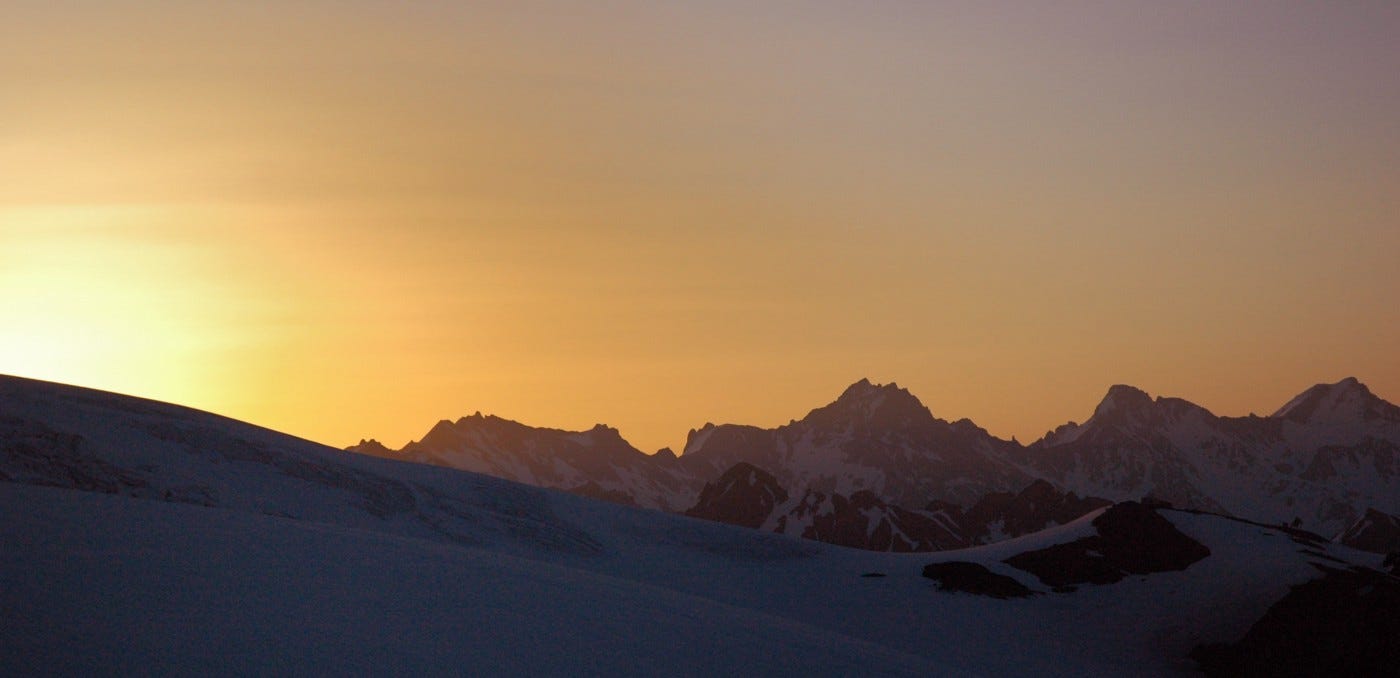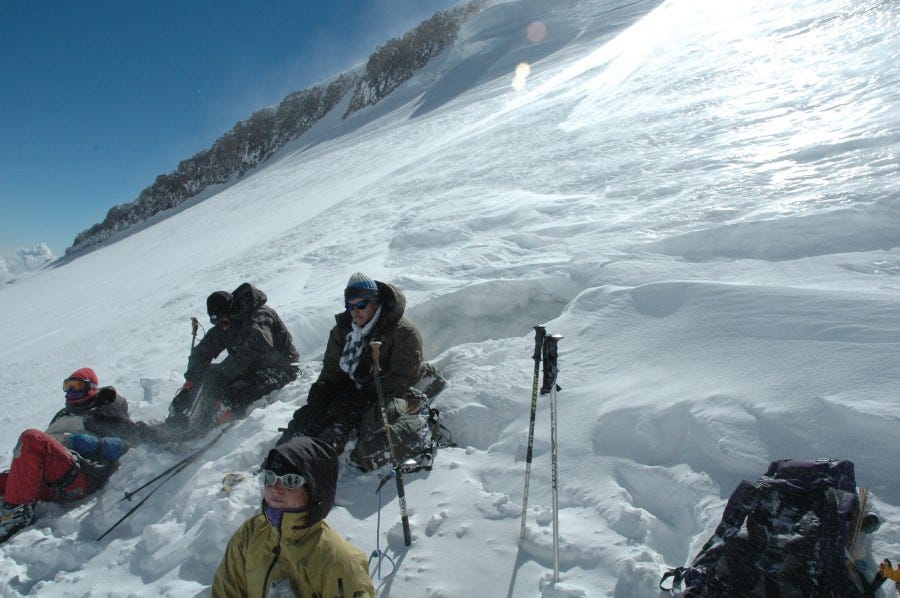Only stupid people start companies...
... or what I learned about entrepreneurship by climbing mountains, and why you should never climb a mountain or start a company alone.
I started climbing mountains as a hobby in my mid-twenties. When my mum heard, she said: “Only stupid people climb mountains; you will die.”
When it comes to my career, I would consider myself lucky. I’ve created and continue to create companies and products with extremely smart people. I’ve raised investments; I’ve failed and fallen down more times than I can count, but never so badly that I couldn’t get up.
When it comes to exits from any of my ventures, I’ve not had the luck of that elusive and amazing exit—the once-in-a-lifetime summit. At least, not yet. Regardless, I would not want to be doing anything else with my life than working with bright people and helping take ideas to fruition in the hope of making an impact.
There is some correlation between entrepreneurs and extreme sports. After all, we thrive in situations where decisions need to be made with only the information at hand, and sometimes, those decisions can be life-altering. Climbing mountains, especially at high altitudes—greater than 3500m—is certainly no different. Let me share some of what I have realized are the similarities between climbing for me and being an entrepreneur. For sure, my mum probably still thinks all this is stupid, but I’m okay with that.
A note: The pictures used in this article come from climbing Mt. Elbrus, one of the world’s so-called Seven Summits and the highest mountain in Europe at 5,642m in the Caucasus of Russia in 2006. More pictures can be found at photos.dups.ca.
1. Dreaming of cloudless summits
The excitement of planning your venture, whether it be scaling a mountain or solving a problem, is fun. The problems and issues lie ahead of you, and the only thing you imagine is standing at the top, flag planted on the ground.
I have heard from many entrepreneurs that they are careful how much they want to reveal about their ideas to others, especially at this planning stage. I cannot disagree more. In business, just like mountain climbing, success does not happen alone. You need to talk to people and network. In talking to people, they will tell you, sometimes randomly, the very thing that will make you successful.
Luck isn’t about getting a fantastic opportunity; luck is being introduced to the person who gives you that fantastic opportunity. I’m not saying go shout it out to everyone if you aren’t comfortable, but your execution is far more precious than your idea. Frankly, few businesses or climbing treks ever get beyond a dream. I have dreamt and seriously planned tackling more summits than I have ever actually started!
2. A team for the ages
You should never climb alone. Without your teammates, you are hardly likely to summit. Even those who climb Mt. Everest by themselves have a team at base camp. We lionize the great CEOs only to realize that without their talented teams and networks, they would have had no chance of success.
Your job isn’t to build the product. Your job is to build the great team to visualize, support, and build that great product or to take you up that mountain. On a mountain, alone, against the wilderness, you will surely find yourself in trouble, maybe not the first time, but certainly at some point. Trust those around you, make them great, and they will in turn make your vision a reality. This is why you will see the same people starting companies together over and over again.
3. The exhilaration and the trepidation
When you first get to the trailhead and look up at what you are about to scale, there’s usually a sinking feeling at the pit of your stomach. And yet you look at your companions and you smile. This is the first test. This first night, you will see if your equipment is all there. Did you train enough? Did you understand what you were getting into? Did you get the right advice?
When your product hits your first customers, were you right? Maybe you solved the wrong problem or didn’t execute correctly on the solution. In climbing, like your first release, it is exhilarating too to look up at that mountain, clouds still on the horizon, the wind picking up. You have already achieved one of the hardest tasks: getting off that couch, putting your feet on the ground, and getting to the mountain. Your first release is out in the wild, ready to take on the world.
4. The grind in the middle
The difference between treks and a business venture is the length of the grind in the middle. With business, the grind can take years. Every day you need to guide your venture, try to understand what you need. During this grind, you will sometimes go to bed crying, wake up sore, put on a brave face, and keep going. You will pivot, find new paths around obstacles, but you will continue.
You will do all this because you have built an amazing team who will sustain you, who will support you, and who will carry you when you cannot go on. They will give you confidence when you have none, and make you smile when you have nothing left in the tank. The strength of the team you have built and the vision you have laid down is what will ensure that when there is a storm and food is low, when arguments flare and the end is nowhere in sight, the majority of the team will continue onwards towards the summit. Conversely, when you have lost the team, look hard at your venture, lest you be left alone on a mountain, a zombie, waiting for the eventual collapse.
5. The search for the summit
Any trekker will tell you about false summits. There’s no worse feeling in the world than getting to the top of one rise and seeing the next rise beyond. I can’t tell you how annoying it feels.
I do know what it feels like to plant that flag, look at each of my teammates, and celebrate that moment—that feeling that you have weathered everything nature and business threw at you and you still managed to win. You did it together, with each other. However, each summit is also a new beginning, just another step in the hard work that lies ahead. Every summit is a precursor for the next one, the next adventure.

6. Telling is not the same as teaching. Listening is not the same as learning.
The last lesson, and ultimately, the most important one: Telling is not the same as teaching; listening is not the same as learning. Have you talked to someone coming down a mountain? They will invariably tell you how great it was. Similarly, in business, don’t always believe what people tell you. There are lots of talking heads. That includes me. Put me in a pub, give me a pint and a topic, and my inner Newfoundlander will come out in spades. I can probably talk you through to my death… and then still keep going.
In reality, success comes from teaching and learning. Teach what you do to anyone and everyone. Your knowledge is not precious, but sharing it is. Teaching means that you must also be willing to learn from anyone that you are teaching. It means your way is not the highway, but you want to work with someone to achieve an end goal of a summit.
Similarly, listening is not the same as learning. Listen to those giving “advice,” including this blog post, but discard probably 95% of what someone “tells” you, and the remainder is probably the “teaching.” The story I tell people after I finish a climb is inherently missing all the bad stuff. Niall Brown and Michael Mannion, who have both trekked and co-founded a company with me, say I have a brain worm which eats all the bad stuff. We rewrite our own past and how things happened; take everything with a grain of salt.
Learning is putting something you heard into practice, analyzing success and failure, looking at the metrics, and reacting accordingly to successfully pivot. Listening will get you out of the storm; learning will help you overcome a disaster.
Even after a half century, I’m still learning to learn.
So what’s the mountain climber’s mantra for business: Plan, Team, Work Hard, Team, Grind, Team, Execute, Team, Teach, Team, Learn, Team, and Summit.
Oh yeah, and to my mum I’d say: it’s okay to be “stupid,” just always be learning.
I originally wrote much of this piece in 2017 after listening to a panel on entrepreneurship in Kingston, Ontario which seemed to be dense with advice which I felt ran counter to what I have written here. I have updated it for 2025.




